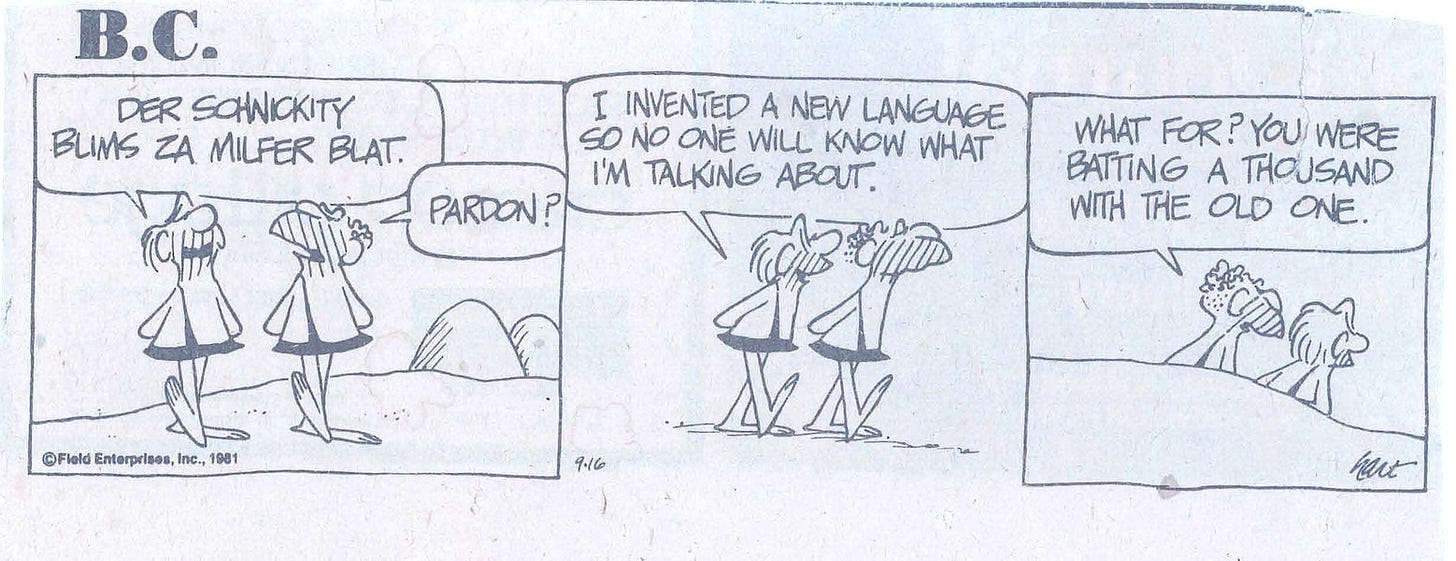When my sons were born, I already had the B.C. cartoon strip below on the refrigerator in our home. The strip was published in 1981. Sean was born in 1983. Quinn, was born in 1986. It didn’t take them long to understand that — and why — the strip was and remains pertinent and hilarious.
"B.C." and Characters: © & TM Ida Hart Trust. All Rights Reserved.
Needless to say, large-language models (LLMs) and artificial intelligence (AI) were likely the sole province of science fiction in 1981. Nevertheless — since we had large problems with language before we had large-language problems — it wouldn’t have taken clairvoyance to realize language, perpetually fraught with challenges attributable to articulation, syntax, grammar, mechanics, and comprehension would inevitably and only be complicated by LLMs and AI.
First, I would straighten out the language. (Confucius, 551 to 479 BC, asked how he would restore order to the world.)
As if to prove my point (and that of Confucius), Ars Technica published an article — “Apple study exposes deep cracks in LLMs’ ‘reasoning’ capabilities” — that said this, in part:
For a while now, companies like OpenAI and Google have been touting advanced "reasoning" capabilities as the next big step in their latest artificial intelligence models … [but] a new study from six Apple engineers shows that the mathematical "reasoning" displayed by advanced large language models can be extremely brittle and unreliable … LLMs don't actually perform formal reasoning and instead mimic it with probabilistic pattern-matching of the closest similar data … the new research highlights just how fragile this kind of mimicry can be when the prompt in question pushes it in a direction that doesn't precisely match any training data. It also highlights the inherent limitations in trying to perform high-level reasoning without any underlying model of the logic or world behind it.
Reasoning capabilities. I love that. I wonder if we’re expecting LLMs and AI to develop reasoning capabilities at the same pace with which we’re abandoning ours. Reasoning has now officially been added to the List of Dying Arts that already included empiricism, common sense, critical thinking, curiosity, well-constructed arguments based on valid premises, and self-faith.
What’s News?
Unless you sit in a zombie-like state, lulled to catatonia by the narrative gibberish of CNN, MSNBC, CNBC, ABC, NBC, CBS, The New York Times, and The Washington Post, you know the mainstream media are the shameless shills of the politicians who fancy themselves our ruling betters. This is not news, kids, whether or not we’ve been paying attention to or — worse — ignoring that fact.
Need a few items of proof? Okay.
Here’s George Carlin from his 1992 HBO special, Jammin’ in New York:
All you ever hear about in this country is our differences. That’s all the media and the politicians are ever talking about: the things that separate us, things that make us different from one another. That’s the way the ruling class operates … they keep the lower and the middle classes fighting with each other so that they, the rich, can run off with all the fucking money … anything different, that’s what they’re gonna talk about: race, religion, ethnic and national background, jobs, income, education, social status, sexuality, anything they can do to keep us fighting with each other so that they can keep going to the bank.
Six years before that, at a press conference on August 12th, 1986, President Ronald Reagan famously said, “The nine most terrifying words in the English language are, ‘I’m from the government, and I’m here to help.’” Yet we still tolerate (ignore, invite) ever bigger, more intrusive, more controlling, more expensive government dependence. We deny it, even as the mainstream media sell it to us, even as we become more dependent, less self-reliant, and less inclined to take individual responsibility for anything in the one nation on Earth that was Constitutionally established to comprise a self-governed citizenry.
Twenty-four years before that, in 1962, Walter Cronkite, the alleged paragon of objective journalism, became the anchor of the CBS Evening News. At the end of every broadcast, he said, “And that’s the way it is,” followed by the date. And we believed him right up until the time he retired in 1981. That’s the way it is? Really? According to whom? What was discussed in the pre-broadcast production meetings? Who were the people in those meetings? What were their agendas? Why?
We didn’t ask then, and we don’t ask now.
The Man in Manipulation
If you’re at all disinclined to believe we’re being had by the mainstream media — to say nothing of how and why — you might find the following two points of interest. If you don’t find them of interest, cast two votes for Kamala and don’t call me in the morning. (Thank you to Jeff Mockensturm for his permission to link to his post.)
Point 1: An article in Psychology Today called, “The Real Reason We Believe What We Believe”, offers the excerpt that follows about bias, laziness, and … uh … media prevarication:
Some cognitive researchers claim that the brain has to consume extra energy in the process of changing or rearranging beliefs, and that simple neurological laziness—the tendency to conserve glucose and oxygen—predisposes the brain to keep the configurations it already has … Partisan political journalism in particular is rife with distortions, tortured facts, selective evidence, and downright lies.
If you’re a devotee of CNN, MSNBC, CNBC, ABC, NBC, CBS, The New York Times, and The Washington Post, you likely think the author of that article, Dr. Karl Albrecht, is full of shit. That, in fact, would prove Dr. Albrecht’s contention.
Point 2: A post on the site of the American Psychological Association — “Why we believe alternative facts” — contained this item of note:
Peter Ditto, PhD, a social psychologist [said], "People are capable of being thoughtful and rational, but our wishes, hopes, fears and motivations often tip the scales to make us more likely to accept something as true if it supports what we want to believe." In today's era of polarized politics—and when facts themselves are under attack—understanding this inclination (and finding ways to sidestep it) has taken on new urgency.
New urgency. There certainly should be new urgency to understanding this inclination [to accept something as true if it supports what we want to believe] and finding ways to sidestep it. But we have no desire to sidestep it. The only urgency we feel is emotional. So, we revert to and act on brute emotion.
This statement from the Ars Technica article rings true: LLMs don't actually perform formal reasoning and instead mimic it with probabilistic pattern-matching of the closest similar data. Especially if LLMs and AI are getting their pattern-matching fodder from CNN, MSNBC, CNBC, ABC, NBC, CBS, The New York Times, and The Washington Post, we’re at least doubling the doses of cognitive-bias-confirming nonsense we feed into the echo chambers every day.
I understand where the gibberish is coming from. What I don’t understand is why we’re falling for it. We have very large language problems, indeed. And they have nothing to do with LLMs and AI.
Der schnickety blims za milfer blat.






LLM "artificial intelligence" is, at this point, little more than a slick interface to a bespoke search engine. I believe there's tremendous potential there, but so long as the same control freaks "manage" what the LLM accesses, it will be as uselessly constrained as Google. It's as if they automated "fact checking" and called it an "AI" after teaching it to only look to certain sources for "facts".